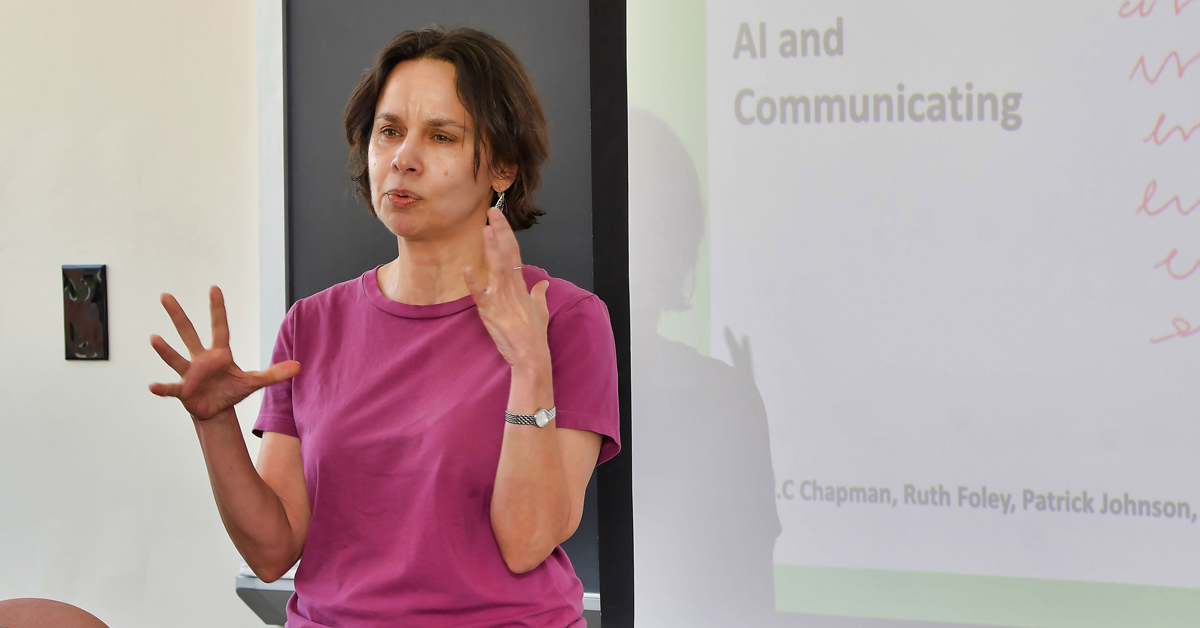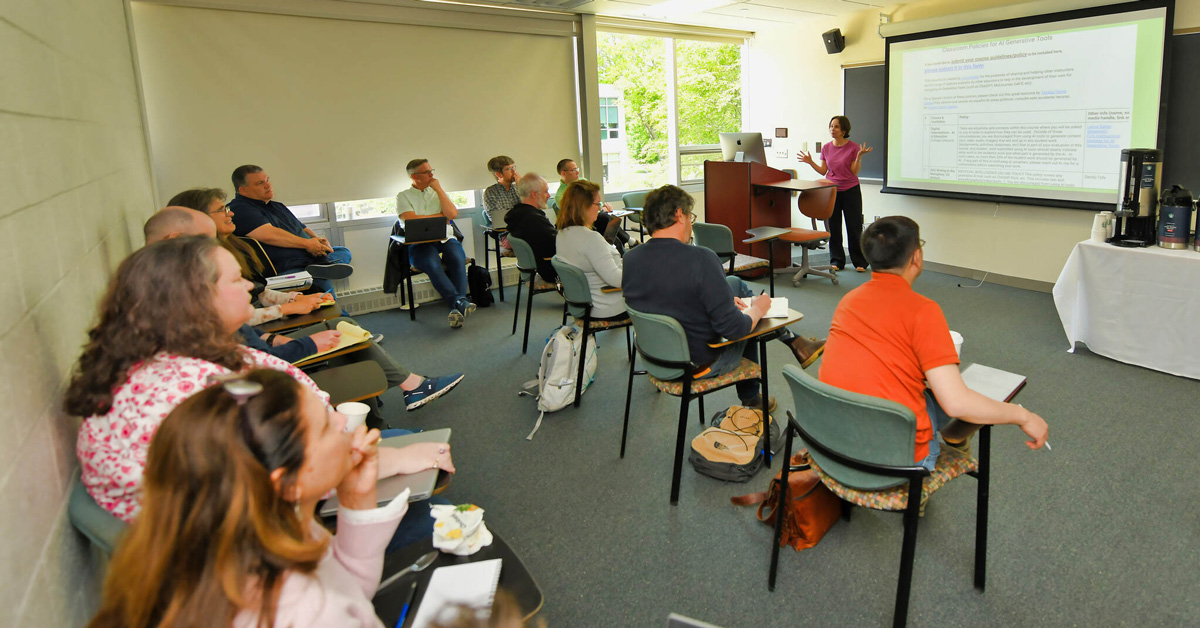A conversation about ChatGPT

Professor Lisa Lebduska discusses advantages generated by artificial intelligence as well as concerns
Even as this introduction was being typed, artificial intelligence (AI) was pointing out misspellings and finishing sentences. And when ChatGPT was asked to produce interview questions for this Q&A session with Professor of English Lisa Lebduska, the Open AI tool did so within seconds. With the rapid advancements in AI and the media attention ChatGPT is generating because of its human-like capabilities, Wheaton College professors have been discussing pedagogical opportunities, as well as concerns and how to address drawbacks. In May, Professor Lebduska facilitated the workshop “Chat GPT, Digital Assistants and Writing” as an overview for faculty and staff. She is one of many professors engaging AI as a teaching tool and offering workshops on the subject. Wheaton magazine editor Sandy Coleman asked her some questions.
Tell us about the discussions you have held regarding AI and ChatGPT.
“Senior Professor of the Practice of English Ruth Foley; Senior Professor of the Practice of English Angie Sarhan and I have offered a faculty brown bag lunch on ChatGPT and a May workshop on the broad category of AI tools, which involved several colleagues, including Associate Professor of Film and New Media Patrick Johnson [showing AI in film]; Senior Professor of the Practice of Business and Management CC Chapman [demonstrating AI images to design logos]; and Professor of Philosophy John Partridge as a discussion leader. I’ve been keenly aware of AI since last summer because it is so central to the teaching of writing and rhetorical analysis. All of my professional organizations, including the Conference on College Composition and Communication, are hosting conferences, workshops and discussion boards focused on the subject.”
How are you using ChatGPT in your coursework?
“Students in my ‘Advanced Writing’ class designed their own writing prompt for ChatGPT and then evaluated the output. I have also distributed a ChatGPT essay and asked students to evaluate it, employing the criteria we have used for peer review.”
What thrills you about the technology and what concerns you?
“I’m thrilled at the potential of it to expand our ability to think creatively and critically and perhaps alleviate more tedious components of work. I’m concerned about the potential loss of jobs and AI’s abilities, as with all technology, to intensify systemic social inequities and injustices while masking them. I’m troubled by its potential to disrupt democracy through the creation of deep fake sound and audio, to ‘hallucinate’ [fabricate information, including citations], combined with the ability to ‘personalize’ misinformation on a massive and rapid scale. And its environmental destructiveness—via the enormous carbon footprint required to train it—is another area of concern.”
In what ways can ChatGPT benefit students and professors?
“It can help writers who feel stuck to get started, help them to organize their thoughts and serve as a grammar and spelling check. Over time, these features might help writers to learn more direct phrasing or even the discourse of a new discipline as they read AI output.
“AI tools can also allow faculty and students to analyze the aspects of these tools that consumer models render invisible. How do they work, how can they be rendered more equitable, what are they missing? What does it mean to ‘write’ and how does the very act of writing—including its difficult moments—help a person to grow?
“The challenge will be for faculty to consider at which points in the creating/writing process do we want students to try to generate something on their own. At which points is struggle a valuable and desirable outcome? Do we want students to use AI to help generate ideas? To help organize? To provide sources? To edit and polish? These are complex questions for each and every discipline, and they are directly related to the foundational questions of writing across the curriculum. In many ways, the questions connected to AI in the classroom are the questions of writing across the curriculum for the 21st century.”

What are some potential drawbacks or limitations?
“Gender and racial biases that reproduce the biases of the internet. We’re facing discrimination by algorithm.
“Another key drawback is that ChatGPT ‘hallucinates,’ which means it fabricates material, and it renders these fabrications in grammatically confident prose, so a naive user could unwittingly be duped and/or reproduce the fabrications by submitting and/or circulating the hallucinations. In time, I imagine that ChatGPT and other AI tools will be refined so that fewer of these hallucinations occur, but at the moment, it’s a real limitation. Additionally, the knowledge base of ChatGPT stops at September 2021, so it cannot accurately respond to questions connected to events or discoveries that occurred after that. It does not cite sources accurately [and it sometimes fabricates sources]. It also has a horrible reputation for its mathematical abilities. But these limits will and are being addressed, by both Open AI and their AI competitors.
“Additionally, there is a risk of preventing us from thinking—if using AI becomes so frictionless, so invisible that we stop thinking about it or about our own thinking, we will have been anesthetized to our own minds. A certain level of struggle, of sorting one’s way through material is necessary to learning and to the development of intellectual resilience. The question always is how much struggle and at which junctures during the composing/research process is desirable.
“There is the possibility that its use might impede the development of a writer’s voice [or voices] if the novice writer sees output and assumes that this is the only way to express an idea. It may also be that a novice user/writer is so impressed or overwhelmed by the output that they cannot see its limits or are too intimidated to offer a different or more complete response. We also need to consider that students should be afforded the opportunity to opt out of using any program such as ChatGPT that collects phone numbers. So, faculty should prepare alternate assignments.”
What steps are being taken by Wheaton to maximize the positive impact of AI?
“Wheaton has been offering events for faculty throughout the year to foster development and to provide space to discuss these tools; ChatGPT is one of many. Associate Provost Gabriela Torres invited a guest speaker to give a Zoom workshop; the Center for Collaborative Teaching and Learning has sponsored Associate Professor of Hispanic Studies Domingo Ledezma to provide a workshop on practical uses of ChatGPT, and we in college writing have delivered two events and plan to do more in the coming year. Kelly Faulkner, director of research and instruction, is offering funding through Library Information Services for faculty members who want to subscribe to a particular AI tool, explore it and report back on it. Library Information Services also has supported a subscription to QuillBot [an AI-powered writing tool] for me.”
How do we maintain the spark of creativity in light of ChatGPT and other AI advancements?
“I would venture that the first step involves motivating students and signaling to them that they have something to say, something to think. We can reinforce the idea that expedience isn’t always desirable, and that we value other aspects of creation, discovery and communication. We need to engage in responsible information literacy instruction, emphasizing that the world of knowledge and possibility is even larger than what the AI yields, which is also what we do when students receive search engine results. There is a difference between possessing information and having understanding. If we can make those messages prominent, we will have succeeded. It is also likely that students will exercise creativity as they learn how best to use word prompts for the AI, refining their questions based on the output they receive.”
What message is important to get across to students regarding this innovation?
“This is a tool, which means you should be using it rather than allowing it to use you. Bring your values to your use of the tool—integrity; a commitment to social equity; a devotion to your own development as a creative, critical thinker. The more we can understand something, the less we have to fear and the more we can contribute to the evolution of these tools. Wheaton students are keenly poised to make these kinds of contributions.”
